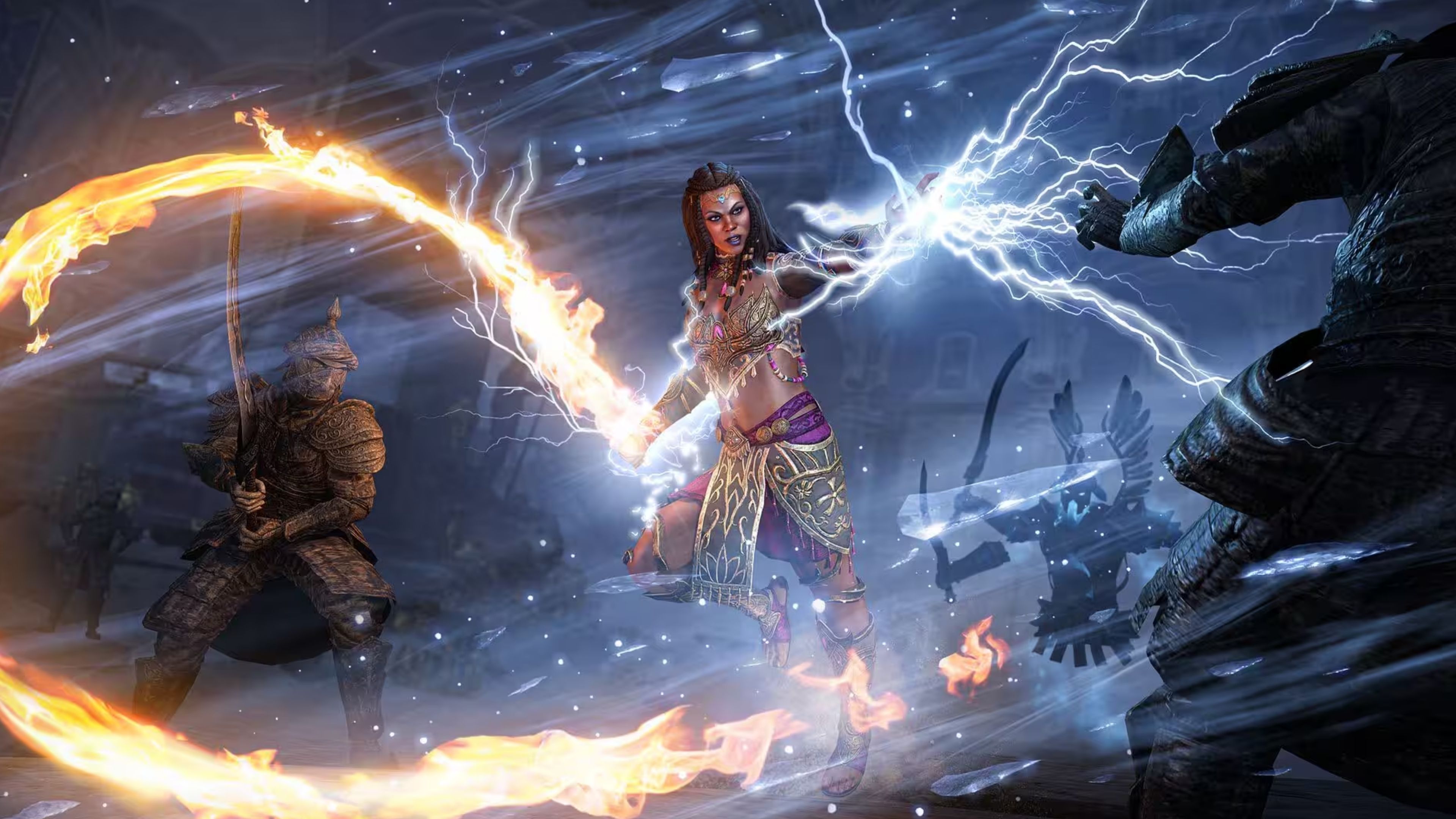Elder Scrolls Online Leads On Subclassing, Recovering From Missteps, And Being A “30-Year MMO”

We don’t get a lot of comebacks like The Elder Scrolls Online in the gaming industry, especially in today’s risk-averse climate. Had the MMO gone through its less-than-stellar launch now, perhaps its fate would have been much different. But as it stands, it’s been going strong for over a decade now.
“I'm the first one to admit that our launch wasn't what we wanted,” says Rich Lambert, studio game director at ZeniMax Online.
Sitting next to him, Elder Scrolls Online’s new game director Nick Giacomini is quick to agree. “It's something we embrace internally. When things were hard, we changed, we adapted.”
Upon reflection, Lambert puts it down to the team not knowing what kind of game they were making. “We were so focused on trying to build a game and have it appeal to as many people as possible,” he recalls. “We wanted to appeal to the other Elder Scrolls players. We wanted to appeal to the MMO players. And when we tried to walk this delicate line kind of between them, we didn't hit at all like at launch.
“When we decided it was Elder Scrolls first, that completely changed our mindset, and we stopped worrying.”
From then on, the team built a game that carried the torch after Skyrim, and is entrusted by Bethesda to tell unique Elder Scrolls stories of its own. At Gamescom this year, Lambert and Giacomini walked me through the past and present of The Elder Scrolls Online, and how they’re confident that they’ve still got decades of stories to tell.
The ESO Team Doesn’t Shy Away From Its Mistakes
“Making games is risky. It's a lot of time, it's a lot of money, and it's not an exact science,” Lambert says, reflecting on the second chance ESO had to appeal to fans.
“I think we were incredibly lucky to have leadership like Robert Altman,” Lambert continues. “He believed in the people, he believed in his IPs, and he believed in the game that we had. And he was like, ‘Go fix it.’”
Robert A. Altman founded ZeniMax in 1999, shortly after the release of Redguard, overseeing The Elder Scrolls through its defining years. ZeniMax Online was founded nearly a decade later in 2007, which is what ultimately gave us ESO.
“I have worked at various studios, various companies over the years. And Robert was special,” he says. “He was the guy who gave us that chance. I don't know that we would have had that same opportunity at other companies.”
Altman passed away in 2021, leaving behind a team that fondly remembers his leadership. Now, with all of the changes in the industry over the course of his tenure, they are all aware that they’re playing by very different rules.
“When I think about when I was a kid, opportunities for entertainment were comparatively limited,” says Giacomini. “And now there are so many games, there are streaming services at our fingertips.
“It's very difficult to succeed. There's so many players that are trusting us with one of the most precious resources, their free time,” Giacomini continues. “Add to that the fact that production costs have increased pretty dramatically. It's challenging.”
There Are Still Missteps To Learn From
That brings us back to ESO’s design philosophy: being an Elder Scrolls game first. Jumping forward to the present day, they say this is the ethos that guided some huge - and divisive - changes to the game, namely subclassing.
“It gets to the heart of The Elder Scrolls, where there are no classes. It allows it to be more like that,” says Giacomini. “Personally, I've been having a lot of fun with an elemental-style sorcerer. That's been just a blast for me to experiment with.”
However, there have been critiques about its balancing and the impact it's having on the meta, with players feeling pressured to go with specific builds if they want to be viable in more social environments, like dungeons and trials. Giacomini admits that the system isn’t “perfect” and changes are coming, but Lambert says players shouldn’t feel compelled to stick with what everyone considers to be best.
“I'm really happy with it, overall, just the amount of customisation that is now possible as a result of that is mind-blowing,” he says. “There's a ‘meta’, right? People say this is the only way you can do a thing. I love going against that, pushing the boundaries, and showing this group does it this way, and that works for them, but this works for me.
“I think overall it's been really positive in the community. I mean, obviously, there's feedback, especially at the top end, where they're like, ‘Now everything's the same.’ Only because you want it to be that way.”
"How do we make it so that players don’t feel like they need to play one particular build to be competitive?" - Nick Giacomini
Lambert also tells me that the team is prepared for things to go wrong,as that’s part of the development process. “We went in eyes wide open,” he says. “We’re confident enough that we know the system's going to work, but we're also confident that players are going to find unique combinations of things, or do things that we didn't necessarily think about and potentially break things. We were comfortable with that. We knew that was going to come.”
Giacomini agrees and says this is always the case with major updates. “I can't think of a single time we launched something and it’s been like, ‘Yes, we did everything right,’” he explains. “We’re listening to feedback and trying to make some changes. Rich alluded to the meta; that’s something we’re really focused on. How do we make it so that players don’t feel like they need to play one particular build to be competitive? That's something that we're having conversations about, we're listening to players, and we have some changes in mind.”
Bridging The Gap Between Skyrim And Oblivion Remastered
As Bethesda has spent the better part of the last decade trucking along with Fallout and Starfield, The Elder Scrolls has been left to the wayside. ESO was, for many years, the most recent game in the series, filling the void left behind after the enormous success of Skyrim in 2011. It’s a huge responsibility for the team to take on.
“We absolutely feel that pressure,” Giacomini reflects. “We want to do right by our players, absolutely. But it's also so cool. We love the lore, and we like pushing it forward and getting to contribute to these incredible thousands of years of history.”
Lambert says that the pressure of being the most consistent source of Elder Scrolls stories during the long wait between mainline entries is eased by Bethesda’s support.
“Todd [Howard] and the team created this unbelievable world, and then we get to share that with them, and we've been carrying that torch for a long time,” he says. “And to Todd's credit [...] he's embraced that as well.”
"[Oblivion Remastered] brought a ton of people back." - Rich Lambert
I ask how much autonomy ZeniMax Online is granted, given that this is, ultimately, Bethesda’s baby. Lambert breaks down how that relationship found its footing.
“One of my favourite stories is from when we were doing the Dark Brotherhood DLC. I worked on Oblivion, so I really understood the Brotherhood,” he begins. “We came up with this story pitch, and I sat down with Emil [Pagliarulo], and it was three pages. We were going through it, and he was like ‘Yeah, there’s some neat stuff here. I need a day to digest this, and I’ll send some feedback’. The next day, he sends me ten pages of like, here’s what you did right, here’s what you did wrong, here’s how I think you can improve and make it better. And that’s been the relationship ever since.”
Sometimes, ZeniMax Online just has to roll with the punches. And one of these punches - or at least something the team thought would be a punch - was the launch of Oblivion Remastered.
“We were nervous when they said they were going to do this,” Lambert admits. “This is the first Elder Scrolls game since we've been out. Like, how is this gonna work? Usually, when we see new games come out, numbers go down for a few days, and then numbers go up.”
Ultimately, they had nothing to fear. “We actually saw our numbers take a step up, which I wouldn't have thought. But it was really incredible to see that it brought a ton of people back.”
The End Is Not In Sight, But With Stop Killing Games, It’s Hard To Ignore
Having gotten over its rough launch, there’s no sign of ESO stopping anytime soon.
“One of the beautiful things about successful [MMOs] is their longevity, because it's a home. It's a home for me, for so many of our players,” says Giacomini. “That passion for our players is what helps to keep this game continuing to be as successful as it is.”
But there will come a day when the game does come to an end, as with any live service. I ask them if any thought has gone into that.
“I've definitely thought about it, a lot actually,” Lambert tells me. “When you go into making games, you're always hoping that they'll kind of last forever. But I'd be lying if I thought 18 years ago I'd still be on the same game, [still] talking about ESO.”
“30-year game? Absolutely. This is a home." - Nick Giacomini
The Stop Killing Games movement has taken off recently, looking to preserve games just like ESO. The campaigners are calling on developers and publishers to futureproof live service games in a way that allows for them to be played after official support is pulled - but Lambert isn’t sure if this is going to be possible with ESO.
“As long as the players want to play the game, we're going to find ways to continue to update it and build on it and grow it,” he says. “But in terms of how does it get handed off? I don't know how that could happen, especially with our technology and all the back-end stuff. It'd be different if we were talking about a single-player game, or a peer-to-peer game, or client servers. I don't know how that would work.”
So, it’s for the best that ZeniMax Online might not have to worry about this for some time.
“Something that stuck with me when Jo Burba took over the role [of studio head], he sat down and he was like, ‘I want this to be a 30-year MMO,” Lambert tells me. “I was like, cool, I’m in.”
That’s a challenge that Giacomini is up for, too. “30-year game? Absolutely. This is a home, and it has been for me since day one at launch, and I want it to be that way, selfishly for myself, but also for our players.”
As for what will pad out those 30 years, we’ll have to see. Both tell me that they know they have 30 years' worth of stories to tell, and right now, the focus is on making Elder Scrolls Online less “formulaic”. So, needless to say, the team is hoping that they won’t just bridge the gap between TES 5 and 6, but beyond that, too.
elderscrollsonlinegamepage.jpgYour Rating
close 10 stars 9 stars 8 stars 7 stars 6 stars 5 stars 4 stars 3 stars 2 stars 1 star Rate Now 0/10Your comment has not been saved
LikeElder Scrolls Online
MMORPG Systems OpenCritic Reviews Top Critic Avg: 71/100 Critics Rec: 39% Released April 4, 2014 ESRB m Developer(s) ZeniMax Online Studios Publisher(s) Bethesda Engine proprietary engine, hero engine Multiplayer Online Multiplayer, Online Co-OpWHERE TO PLAY
DIGITAL












